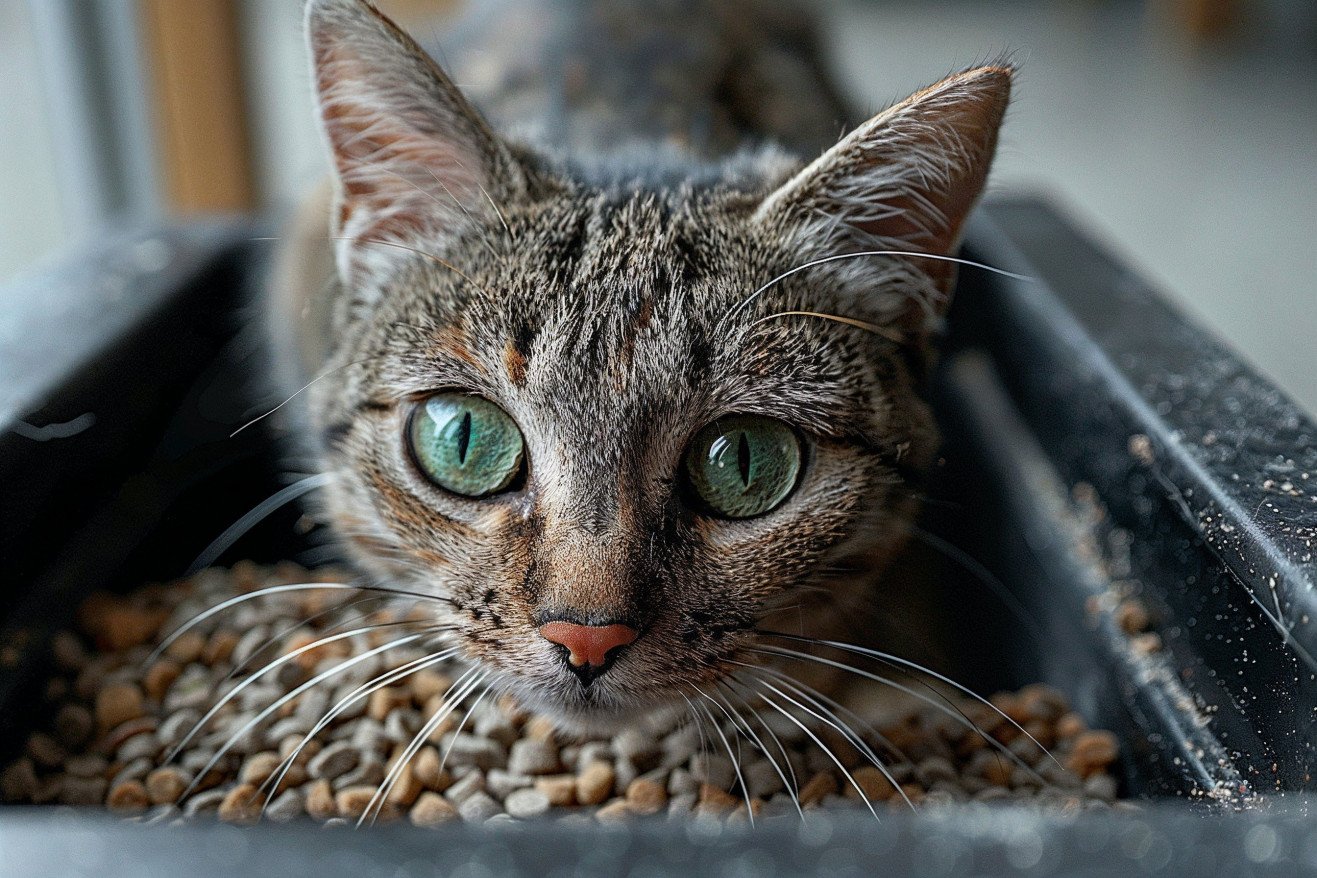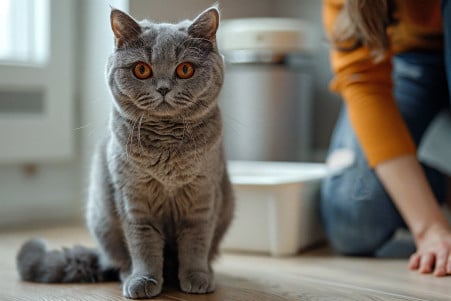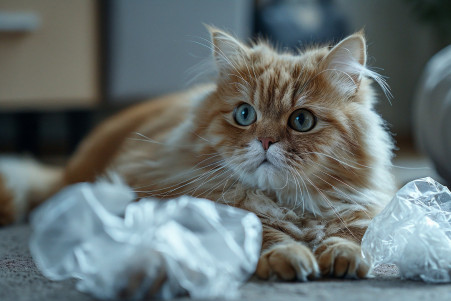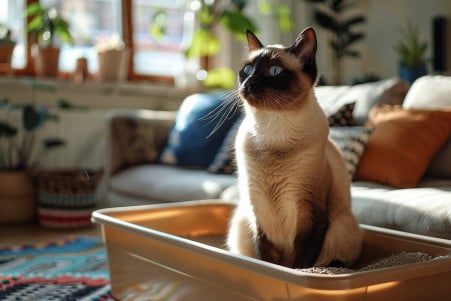Why Do Cats Eat Litter? Causes and How to Stop It
6 June 2024 • Updated 5 June 2024

Knowing why cats eat litter and how to prevent it is important for your cat's overall health. Cats may eat litter because of medical problems like intestinal disease or nutritional imbalances, but they may also eat litter because they're bored, stressed, or were weaned too soon. To prevent your cat from eating litter, you can try switching to an unpalatable litter, increasing enrichment, and making sure your cat is getting regular checkups.
By reviewing veterinary research on pica (the consumption of non-food items) in cats and referencing animal behaviorists, we'll explore the potential causes of this worrisome behavior. This article will give you the information you need to prevent your cat from eating litter and help you identify and address any medical issues that may be contributing to the problem. By the time you're done, you'll have a better idea of what's motivating your cat and the information you need to make your cat's environment as safe and healthy as possible.
Why do cats eat litter?
Medical Reasons and Risks of Eating Litter
Pica, the consumption of non-food items like cat litter, can be a sign of an underlying medical issue in cats. According to veterinary professionals cited by Hill's Pet, cats with anemia, leukemia, kidney disease, or certain nutritional deficiencies may develop pica and eat litter. Anemia, which is a lack of healthy red blood cells, is especially common and can be caused by diseases like feline leukemia virus (FeLV) or feline infectious peritonitis (FIP), per Cats.com.
The dangers of eating litter are real and can include intestinal blockages, toxicity from chemicals or additives in the litter, and malnutrition from eating litter instead of a balanced diet. Per PetMD, clumping clay-based litters are particularly likely to cause intestinal blockages if ingested. While other natural litters may be less dangerous if ingested, veterinary attention is still necessary.
If your cat is eating litter, it's important to see a vet as soon as possible. They can diagnose any underlying medical issues that may be causing the pica and treat them accordingly. It's important to treat things like nutritional deficiencies or diseases to ensure that the litter-eating behavior is resolved safely and your cat's overall health is supported.
Behavioral and Environmental Factors That Can Cause Litter-Eating
Cats may eat litter due to boredom, stress, or anxiety, and it may be a way to self-soothe, says The Spruce Pets. Meanwhile, kittens may eat litter because they're curious when they're first learning to use the litter box, but they should grow out of this behavior. Petfinder explains that kittens and adult cats that were weaned too early may be more likely to eat litter.
Meanwhile, World's Best Cat Litter says that cats may eat litter if the type of litter they're used to is changed or if their litter box is moved because they may see the new litter as a food source. The experts also say that environmental enrichment, like toys and scratching posts, and reducing stress can help prevent litter-eating. By making sure you're taking care of the behavioral and environmental issues that may be at the root of the problem, you can discourage this worrisome behavior and help your cat stay healthy.
Training and Positive Reinforcement Methods to Stop Litter-Eating
Positive reinforcement can be used to deter negative behaviors like litter-eating, according to the Independence Veterinary Clinic. Positive reinforcement means that you give your cat a reward, like a treat or praise, when they exhibit a positive behavior, like using the litter box. Modkat suggests that you can also train your cat to stop eating litter by consistently calling them away from the litter box when they start to eat the litter and giving them something else to chew on, like cat grass or a toy, to redirect their behavior.
HSHV explains that the most important part of training cats is to make sure that you're using high-value rewards and that you're giving them to your cat immediately after they exhibit the desired behavior. You'll also want to make sure that you're patient and consistent with your training, as it can take time for your cat to learn a new behavior. Still, with the right positive reinforcement methods, you can help your cat stop eating litter and start using the litter box the way they're supposed to.
Safer Litter Alternatives for Cats That Eat Litter
If your cat is prone to eating litter, natural, biodegradable litters such as those made from corn, wheat, pine, or grass seed may be a safer alternative, according to The Business Insider. These litters tend to be dust-free, control odors, and are less toxic if ingested than traditional clay litters. Cats.com explains that corn, wheat, and grass seed litters clump well, making them easy to scoop, while pine and wood-based litters are very absorbent.
That said, SoyKitty warns that some cats may still eat natural litters, so cats should be supervised. In particular, clumping clay litters are especially dangerous if eaten, as PetMD has pointed out. It's important to talk to a vet to make sure you're choosing the best litter for your cat's specific needs and health issues.
By choosing a natural, biodegradable litter that's less likely to be eaten, you can make your home environment safer for cats that eat litter. That said, it's still important to address the underlying issues, which we'll discuss in the next section.
Dealing With Underlying Issues and Enriching Your Cat's Environment
To ensure that your cat doesn't go back to eating litter in the future, it's important to deal with the underlying causes of the behavior, according to Catster. One way to do this is to enrich your cat's environment with toys, scratching posts, and other items that can help reduce stress and boredom, which are common reasons for litter-eating, according to The Humane Society.
It's also important to make sure that your cat's litter box is clean and well-maintained. That's because, according to Healthy Pets Mercola, litterbox aversion is responsible for 50% of all cat behavioral problems and is one of the top reasons that cats are surrendered to animal shelters. If you think that your cat may be eating litter because of a nutritional deficiency, Hill's Pet suggests talking to your vet about dietary changes or supplements.
If your cat's litter-eating behavior doesn't improve or if it gets worse, it's important to talk to a vet or an animal behaviorist. These professionals can help you get to the bottom of the issue and treat any underlying medical or behavioral problems. By addressing any underlying issues and enriching your cat's environment, you can help your cat overcome their litter-eating habit and improve their quality of life.
Conclusion: How to Keep Your Cat Safe and Healthy
World's Best Cat Litter, a natural clumping litter made from corn, may be a safer option for cats prone to litter-eating. It is non-toxic and biodegradable, which could make it less hazardous if ingested. However, some potential drawbacks are that it may not provide the best odor control, and the small granules can lead to litter tracking.
In addition to the risk of intestinal blockages, there are other health concerns associated with litter-eating. Cats that eat litter are at risk of bacterial infections such as salmonellosis, parasitic infections such as toxocarosis and ancylostomiasis, and protozoan infections such as cryptosporidiosis and toxoplasmosis. These risks can be minimized by maintaining good hygiene, regularly deworming cats, and avoiding contact with cat feces.
In one case report, a cat that chronically ate bentonite-containing litter developed hypokalemia and severe anemia, which the authors suggested was consistent with toxicosis from the clay litter. This case emphasizes the importance of choosing a safe, non-toxic litter for cats that eat their litter.
Veterinary care is important to rule out medical conditions and ensure your cat's safety. With time and the right interventions, you can create a safe, healthy space for your cat.


